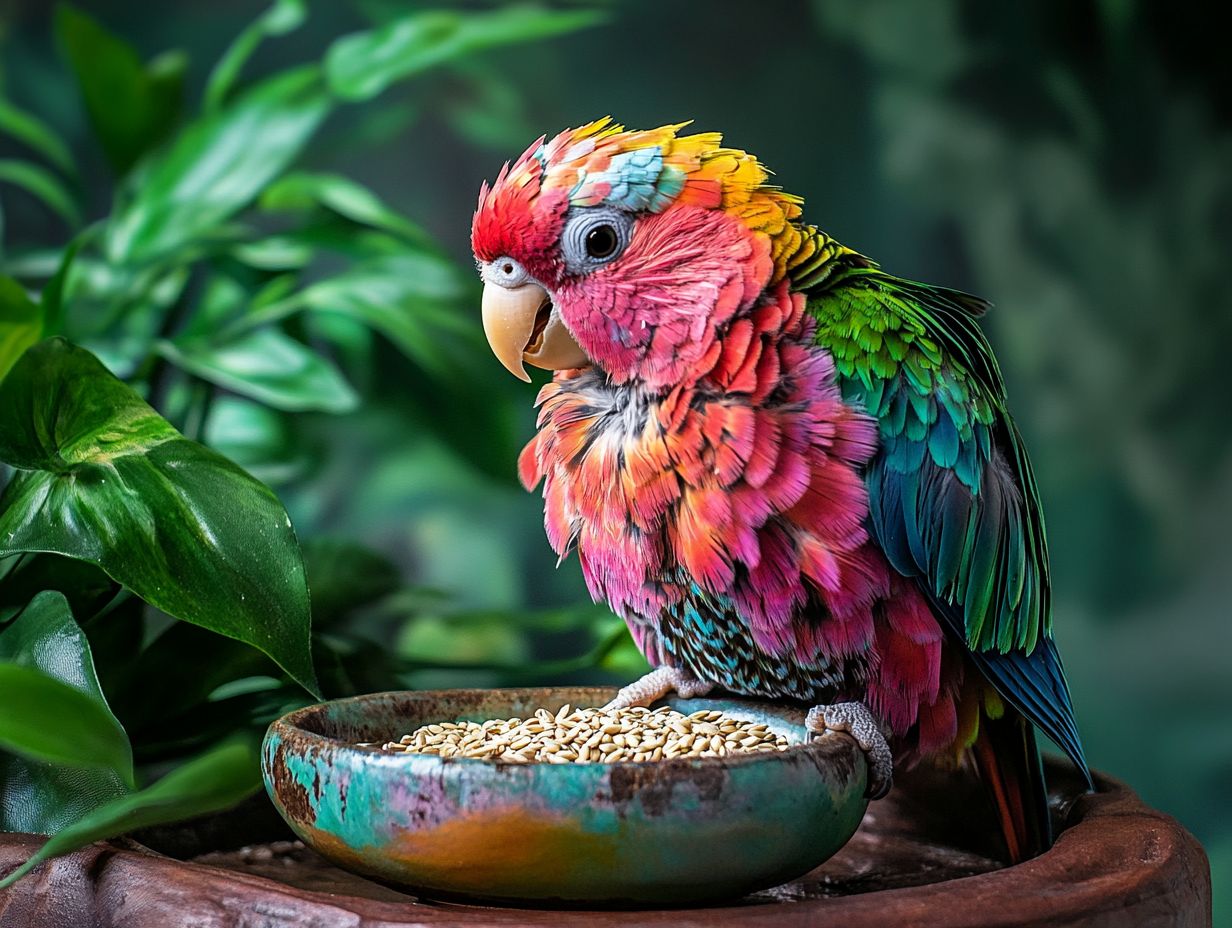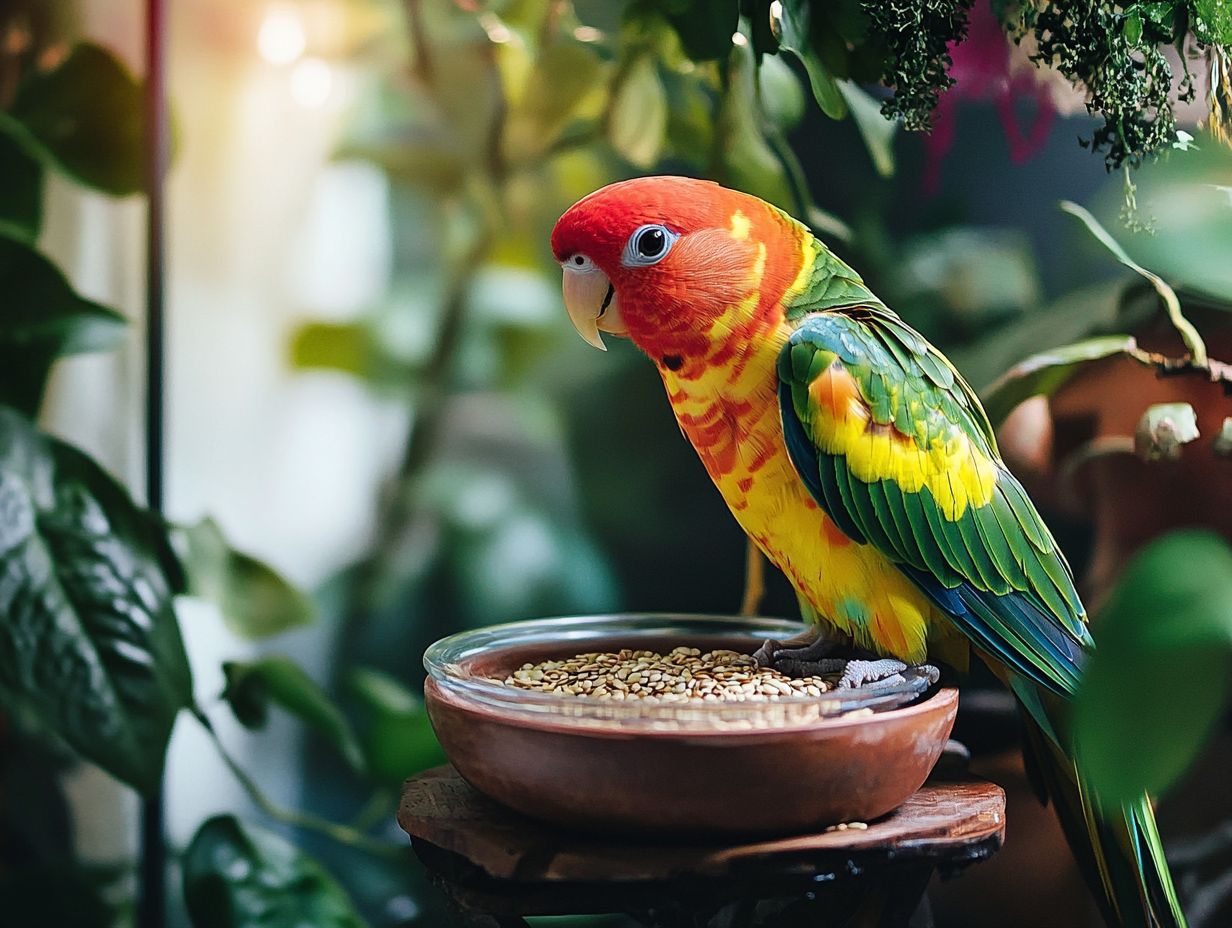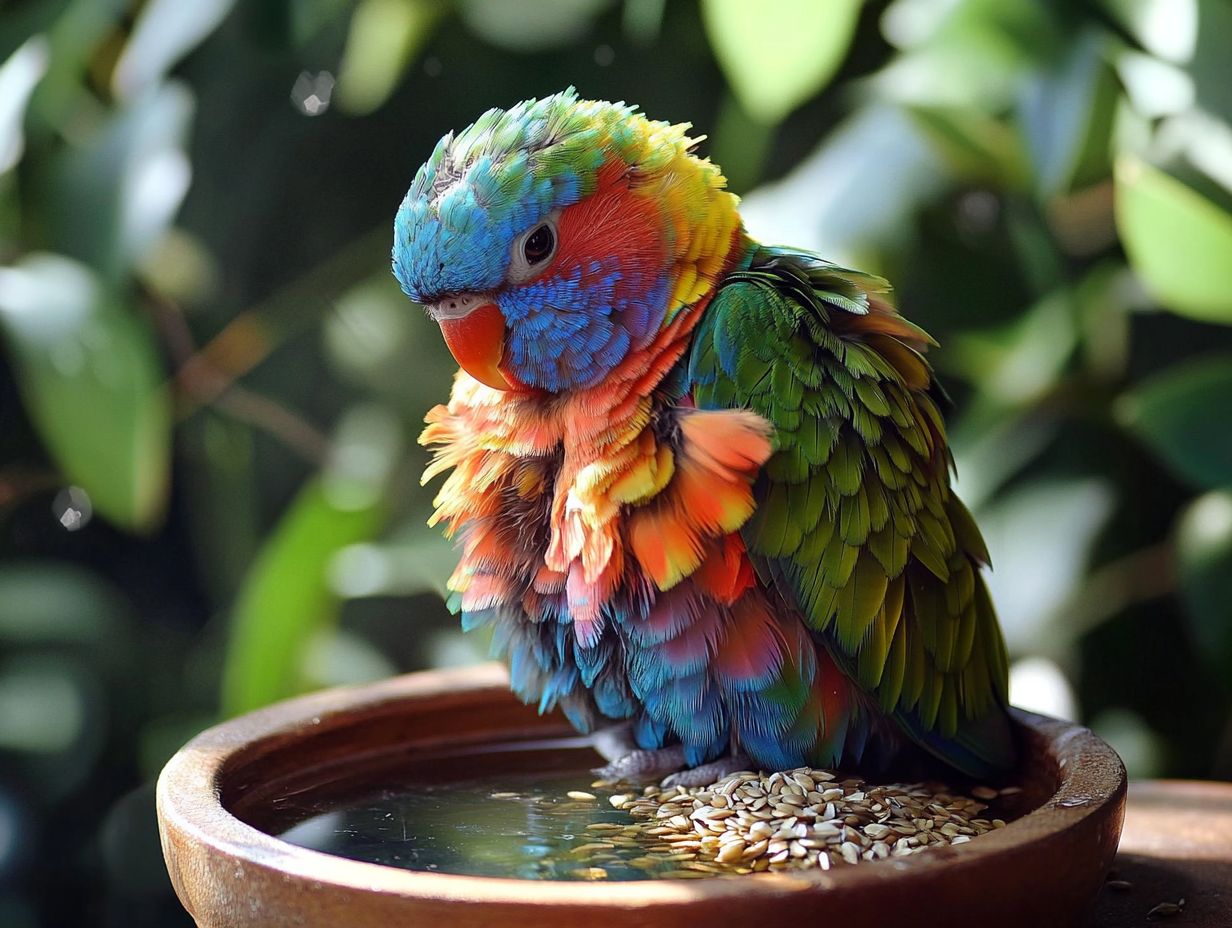How to Identify Bird Health Symptoms?
Caring for your feathered friends demands a nuanced understanding of their bird health and well-being. Just like any beloved pet, birds exhibit unique signs of good health and potential ailments that you should be aware of.
This guide delves into the essentials of bird health, from recognizing normal behavior to pinpointing common health issues. You ll discover how to identify symptoms that may indicate illness and know exactly when it s time to consult a veterinarian.
We ll share best practices for keeping your bird both happy and healthy. Whether you re a seasoned bird owner or just starting your journey, this guide offers valuable insights to help your avian companion truly thrive.
Contents
Key Takeaways:

- Pay attention to your bird’s normal behaviors and appearance, as these are key indicators of good health.
- Common health issues in birds include respiratory and digestive problems, which can be identified through physical and behavioral changes.
- If your bird exhibits unusual symptoms, seek veterinary care immediately and follow preventive measures to maintain good bird health and be prepared for emergencies.
Understanding Bird Health
Understanding bird health is essential for both pet owners and avian enthusiasts. It involves numerous aspects, from the physical condition to the behavior of your feathered friends. By familiarizing yourself with the signs of a healthy bird versus those indicating illness, you equip yourself to offer superior care.
Regular check-ups with an avian vet can help find bird diseases early. Recognizing slight changes in your bird s behavior and health can greatly affect their life span and quality of life.
This in-depth knowledge gives you the power to provide effective care and ensures your bird receives the best veterinary attention when needed.
What is Normal for Birds?
A healthy bird showcases a variety of normal behaviors and physical traits that serve as essential indicators of its overall well-being.
Look for vibrant feather condition, as this reflects good nutrition and proper care. The coloration and consistency of droppings also provide valuable insights into diet and digestive health. Ideally, droppings should appear firm and moist, featuring a balanced mix of colors that suggest a nutritious diet. Recognizing these normal signs is vital; any deviations can signal health issues that require a visit to an avian vet or consultation with the Association of Avian Veterinarians.
By staying attuned to these details, you not only cultivate regular bird care practices but also ensure that any potential health concerns are promptly addressed ultimately promoting a longer, healthier life for your cherished companions.
Signs of Good Bird Health
Spotting the signs of a healthy bird is essential for any bird owner looking to keep their pet happy. By observing your pet birds closely, you can catch any changes in their appearance, behaviors, and routines that might signal potential health concerns.
Look for physical indicators like vibrant feathers, a regular appetite, and healthy droppings; these are all telltale signs of a thriving bird. Additionally, being aware of common pet bird health concerns can provide you with vital information, allowing you to seek timely intervention from an avian veterinarian when necessary.
Physical and Behavioral Indicators
Physical and behavioral indicators are essential for you to assess the health of birds, offering valuable insights into their well-being and potential issues.
By regularly observing factors such as weight, feather quality, and droppings, you can glean significant information about a bird’s overall health. For example, a sudden change in weight may point to underlying nutritional deficiencies or stress, while the condition of feathers like dullness or excessive molting can signal avian diseases. To learn more about these signs, check out our guide on how to identify health issues in budgies. Pay attention to the color and consistency of droppings; any abnormal hues or textures might indicate infections or gastrointestinal troubles.
Behavioral signs, such as social interactions and activity levels, are equally important; if you notice lethargy or withdrawal from flock mates, it could suggest an illness. By closely monitoring these indicators, you can ensure your feathered friends stay vibrant and full of life!
Being proactive about your bird’s health care is vital, so keep these tips in mind to help your feathered friends thrive!
Common Health Issues in Birds

Common health issues in birds can present in various ways, often causing considerable distress for both the bird and its owner if not addressed swiftly. To better recognize these issues, understanding bird behavior as health indicators is crucial; you might notice symptoms such as a decline in appetite or weight loss.
It’s essential for you as a bird owner to remain vigilant about these signs and seek veterinary care when needed. Diagnostic tests conducted by a bird-related veterinarian can unveil underlying diseases that may not be immediately obvious.
By understanding these common health issues, you can take proactive steps in caring for your feathered companion.
Spotting Ailments Early: What to Look For
Identifying and managing common ailments starts with recognizing the signs of illness, which may manifest as changes in behavior, appetite, or physical appearance.
Understanding these symptoms is crucial for any bird owner, as they often signal health issues needing your attention. For example, if you notice a decrease in vocalization or increased lethargy, it could indicate stress or illness. Learning how to recognize bird behavior patterns can help you identify these changes more effectively.
Watch for signs like unusual feather loss or changes in droppings; these should raise significant alarms.
By honing your observational skills, you can act swiftly. Implementing first aid measures at home like isolating the affected bird and creating a stress-free environment might offer immediate relief. Don’t wait! Consult a bird-related vet immediately to ensure your bird’s health.
Recognizing Symptoms of Illness
Recognizing the symptoms of illness in birds is essential for timely intervention and effective care. By understanding how to recognize avian respiratory issues, you can detect problems early, as birds can conceal their discomfort, often waiting until their condition escalates to a serious level.
By being vigilant and attentive to subtle signs of distress, you can play a pivotal role in safeguarding their health and well-being.
Physical and Behavioral Changes to Watch For
Physical and behavioral changes can serve as critical indicators of potential health issues, prompting you to take action.
These changes may include increased aggression, which might suggest stress or discomfort, and lethargy, indicating serious underlying conditions. Paying attention to feather loss is vital; it may point to nutritional deficiencies or infections.
Alterations in droppings, like unusual color or consistency, can reveal essential insights into your bird’s digestive health.
Recognizing these signs and their significance is crucial for prompt intervention, safeguarding your feathered companions’ health and preventing avian diseases.
When to Seek Veterinary Care
Knowing when to seek veterinary care is essential, especially when you notice concerning symptoms that may signal serious health problems. Being attentive to their well-being can make all the difference in ensuring they receive the necessary care promptly.
Determining the Severity of Symptoms

Determining the severity of symptoms in birds is crucial for ensuring effective veterinary care and timely intervention. To assess the situation, consider factors like the environmental temperature and any recent changes in medications or diet, along with understanding bird vocalizations and health.
The duration of symptoms is particularly important; if an issue persists, it may signal a more serious condition compared to something temporary. The severity of symptoms gives important clues about how urgently you need to act. Drastic weight loss, labored breathing, or continuous vocalizations are significant red flags that warrant immediate attention.
Watch for any changes in behavior, such as increased lethargy or withdrawal from social interactions; these can further indicate distress.
By evaluating these elements collectively, you can make informed decisions and seek appropriate medical help without delay.
Stay alert and proactive in monitoring your bird’s health! Your attentive care can make a world of difference for your feathered friend.
Preventing Health Issues in Birds
Preventing health issues in your birds starts with adopting proactive care practices and familiarizing yourself with potential avian diseases that could impact your pet. Regular check-ups with an avian veterinarian are essential for keeping your bird healthy and happy!
Being prepared for emergencies is equally important. Prepare for emergencies by having a dedicated first-aid kit for birds and knowing the location of the nearest avian veterinarian for urgent situations. By creating a nurturing environment and practicing careful watching of your bird, you can ensure that your pet enjoys a long, healthy life.
Best Practices for Maintaining Bird Health
Implementing best practices for maintaining bird health is crucial. A balanced diet, rich in seeds, fruits, vegetables, and specially formulated pellets, serves as the foundation for their good health.
It’s vital to create a suitable living environment that mimics their natural habitat. This means providing ample space for exercise, perches of varying diameters, and enriching toys that offer mental stimulation.
Don’t overlook the importance of scheduling regular check-ups with an avian veterinarian, as these visits can facilitate early detection of health issues. Act now to ensure your feathered friend enjoys a long and vibrant life!
Frequently Asked Questions
What are some common bird health symptoms?
Some common bird health symptoms include changes in behavior, such as decreased activity or appetite, physical signs like feather plucking or abnormal droppings, and respiratory issues like coughing or sneezing. Knowing how to identify common bird diseases can help you take appropriate action.
How can I tell if my bird is sick?

You can tell if your bird is sick by observing changes in their behavior, appearance, and bodily functions. These may include lethargy, decreased appetite, weight loss, unusual physical signs, and abnormal droppings. Additionally, it’s important to understand how to spot nutritional deficiencies in birds to ensure their overall health.
What should I do if I notice my bird exhibiting health symptoms?
If you notice your bird exhibiting health symptoms, it is crucial to contact a veterinarian who specializes in avian health. Additionally, understanding how to identify common bird injuries can help you provide important information during the visit. They will be able to properly diagnose and treat your bird’s condition.
Are there any preventative measures I can take to keep my bird healthy?
Yes! In addition to regular check-ups with a veterinarian, ensure your bird has a balanced and nutritious diet, a clean living environment, and proper hygiene practices, such as washing your hands before and after handling your bird.
Can stress affect a bird’s health?
Yes, just like humans, birds can experience stress, which can negatively impact their health. Common sources of stress for birds include changes in routine, loud noises, and interactions with other animals.
What are some signs of a healthy bird?
Some signs of a healthy bird include bright and alert behavior, a smooth and glossy coat of feathers, clear and bright eyes, and regular and firm droppings. They should also have a good appetite and be active and social.





